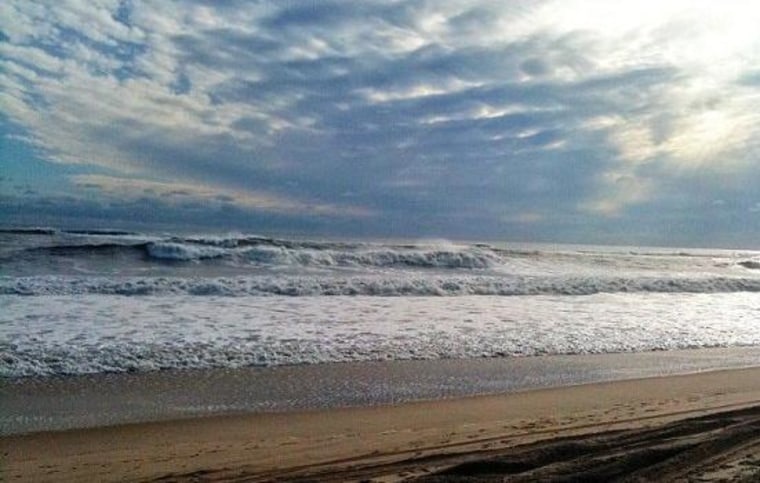Yesterday Jesse Aizenstat came on the show to tell us about what it was like surfing from Israel to Lebanon.
Apparently - because he couldn't find work - he had to settle for pitching a book idea to a surf magazine. I guess it was that or McDonald's. Now while his command over language leaves much to be desired, there is a nugget of truth to the genesis of his book. And that truth is the Ocean.
You'll noticed I capitalized it - Ocean. Consider it a sign of deference. I'm from an Ocean town, way out on the tip of Long Island. Surf Capitol of the east coast. Most of my childhood was spent in and around the Ocean. When I was probably way too young, my parents would drag me out into the Ocean, through the break, and spin me around to face the shore. On days where there was a swell, the shoreline vanishes and re-emereges behind the blue rolling hills. We'd watch as people fought fruitlessly against its power, against its current, against its will.
It's amazing the different plans of attack you see at the Ocean, from people who are so clearly unprepared to deal with it. Grown men and women who obviously can barely swim, with their hands held high in pre-surrender, kids in goggles whose parents clearly left them woefully unprepared, people holding their noses and trying to sit down in some imaginary safety-chair, people with their tee-shirts on taking the waves full-bore in the face, and tumbling backwards. There's something very telling about the way a person reacts to the Ocean, how well they swim, how they time their dives, when they come up for air - it doesn't just tell you about them, it tells you about the culture they were brought up in. Out east, there are kids 5 and 6 years old that skip across the Ocean's surface like flattened stone, barely grazing the water as they trace their path. By the time they're approaching their teens, they're waiting with bated breath for a hurricane to pass by, so they can play in it's wake. The culture raises their kids to be comfortable in the water, because for generations the Ocean sustained the town.
So kids like me get pulled out beyond the break, where all you can barely hear the faint sounds of the people on the shore - and then we're given a little push. I know it sounds dangerous, but what kid in their right mind is going to leap on their own? No, it's the parents, or the uncles, or the siblings that give you the shove, strapped to whatever floatation you have (surfboard or bodyboard), heading down the hills. "Hold on tight!" is shouted into your tailwind, but the wall of water blocks it out. Like many events in your life, the virgin mission almost always ends in embarrassing wreckage, but pretty soon you're excited to try again. And you do, you spend a large portion of your childhood paddling out with friends and strangers alike - your parents on the beach, and in the back of your mind.

This weekend we got our first decent swell of the summer, and I was lucky enough to be home for it. The water was brown, the break was uneven, but we got our fix. I spent enough time getting tossed around by the Ocean that I'm still sore as I type this. I'm 28 now, when the wave closes out on me - well, the sand just feels harder than it used to... maybe I'm just getting softer. And my parents aren't pushing me into the waves any more - in fact, more often than not they're the ones telling my brothers and I to take it easy. We don't.
There's a thrill in the initial fear of your first rides that you never really stop chasing. I'm not a soul-surfer like some of the kids I grew up around. They graduated to surfing, and I kept bodyboarding. They're more committed, voyaging to spots that are hidden, tucked away from weekend infiltrators. I'd rather pick a beach nearby where I'm not forced to walk on foot for 20 or 30 minutes. Many of them still live out there, within walking distance of the home they grew up in. And sometimes - on days where I'm feeling extremely melodramatic - I worry that if I move too far from the Ocean I'll shrivel up like a sponge in the sun. It's probably not true. But even here - from my Manhattan apartment - I can still feel the pull of the Ocean's current, trying to drag me back.
